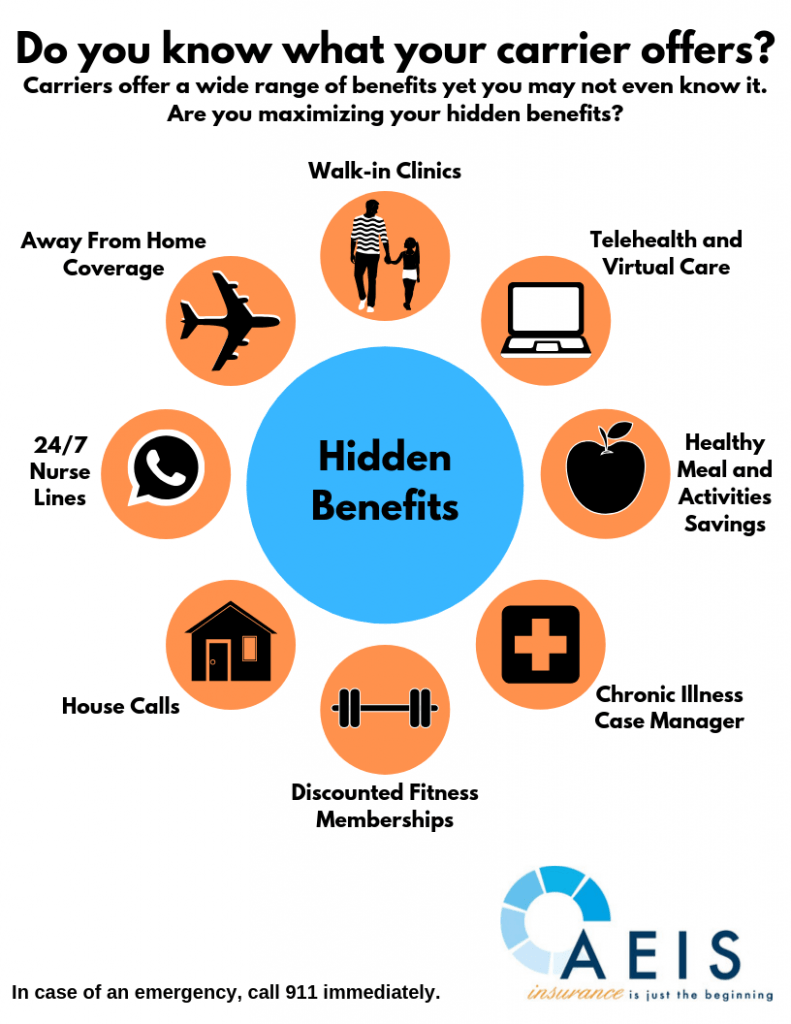Medicare Advantage Agent Can Be Fun For Everyone
Medicare Advantage Agent Can Be Fun For Everyone
Blog Article
The Medicare Advantage Agent PDFs
Table of ContentsMedicare Advantage Agent Can Be Fun For EveryoneLittle Known Questions About Medicare Advantage Agent.The smart Trick of Medicare Advantage Agent That Nobody is Talking AboutMedicare Advantage Agent Fundamentals ExplainedThe 8-Minute Rule for Medicare Advantage AgentFacts About Medicare Advantage Agent RevealedFascination About Medicare Advantage Agent

Major diseases can set you back sometimes that. Health and wellness treatment coverage assists you get the treatment you need and protects you and your family economically if you obtain unwell or hurt. You can get it with: Your job or your spouse's task, if the employer offers it. You must meet eligibility requirements for government healthcare programs. For even more information regarding federal government programs, check out Benefits.gov. Find out more: Medical insurance: 5 points you might not understand See: Are you unexpectedly requiring medical insurance? You can include your household to a work health plan. If you get from an insurance provider or the marketplace, you can purchase
a plan that additionally covers your family members. They do not have to live in your home, be registered in school, or be claimed as a based on your income tax return. You can maintain married children on your strategy, yet you can not add their spouses or youngsters to it. If you have reliant grandchildren, you can keep them on your plan till they transform 25. You can purchase other times just if you shed your protection or have a life change. Life adjustments consist of things like marrying or
separated, having an infant, or adopting a child. You can sign up for a job health and wellness plan when you're first hired or have a significant life modification. They can't deny you insurance coverage or charge you much more due to a pre-existing condition or disability. The price depends upon your circumstances. You'll need to pay premiums and component of the cost of your treatment. A premium is a month-to-month fee you pay to have insurance coverage. To decide your costs, insurance provider will take into consideration: Your age. Whether you smoke or use cigarette. Whether the coverage is for a single person or a family. They might not consider your gender or wellness elements, including your case history or whether you have a handicap. Premiums for private strategies are secured for one year. Fees usually increase when the strategy is renewed to show your age and greater health treatment prices. All health insurance need you to.
pay some of the expense of your health care. This is called cost-sharing. In addition to premiums, you usually need to satisfy an insurance deductible and pay copayments and coinsurance. A is the amount you should pay prior to your strategy will pay. If your deductible is$ 1,000, your strategy will not pay anything till you have actually paid $1,000 yourself.
You'll additionally have a copayment if you go to the emergency room or see a professional. The quantities vary by strategy. is a quantity you spend for a covered solution after you have actually met your deductible. It's usually a percent of the expense of the service. For instance, your health insurance could pay 80 % of the expense of a surgical treatment or healthcare facility remain.
The percentage you pay in coinsurance differs by plan. You typically do not have to pay coinsurance in an HMO. Federal regulation sets limits on the amount you pay out of pocket in a strategy year. Some strategies have reduced out-of-pocket limitations. After you get to the limitation, you do not have to pay copayments or coinsurance for the remainder of the plan year.
Some Ideas on Medicare Advantage Agent You Should Know

The 4 kinds are: HMO strategies. Exclusive service provider (EPO) strategies. Preferred service provider (PPO) strategies. Point-of-service strategies. All 4 types are taken care of care plans. This suggests they contract with doctors and other health care service providers to treat their members at affordable prices. These providers comprise a strategy's network. Managed care plans limit your choice of physicians or motivate you to use doctors in their networks.
The plans differ in the extent to which you can make use of medical professionals outside the network and whether you need to have a physician to manage your treatment. You need to utilize companies in the HMO's network. If you don't, you might have to pay the complete expense of your care on your own. There are exemptions for emergencies and if you require treatment that isn't offered in the network. Medicare Advantage Agent.
You'll also have a copayment if you most likely to the emergency area or see an expert. The amounts differ by plan. is a quantity you pay for a protected solution after you've fulfilled your deductible. It's usually a percent of the cost of the service. For instance, your health insurance plan might pay 80 % of the price of a surgical procedure or health center stay.
The Single Strategy To Use For Medicare Advantage Agent
The percentage you pay in coinsurance varies by strategy. You typically do not have to pay coinsurance in an HMO. Federal law sets restrictions on the quantity you pay of pocket in a plan year. Some strategies have lower out-of-pocket restrictions. After you reach the limit, you don't have to pay copayments or coinsurance for the remainder of the plan year.
A strategy year is the 12-month duration from the day your insurance coverage began. For circumstances, if your insurance coverage began on September 1, your strategy year lasts till August 31. Find out more: How to save money at the doctorCare alternatives and prices There are 4 sorts of significant medical health and wellness plans in Texas.
The four types are: HMO strategies. Unique provider (EPO) strategies. Preferred carrier (PPO) strategies. Point-of-service plans. All four kinds are taken care of treatment plans. This means they agreement with physicians and other health treatment service providers to treat their members at affordable rates. These service providers compose a strategy's network. Managed treatment plans limit your selection of physicians or encourage you to make use of physicians in their networks.
The plans differ in the level to which you can make you could look here use of medical professionals outside the network and whether you must have a doctor to manage your treatment. You need to make use of carriers in the HMO's network. If you don't, you could have to pay the complete cost of your care on your own. There are exceptions for emergency situations and if you need treatment that isn't available in the network.
The Buzz on Medicare Advantage Agent
You'll likewise have a copayment if you most likely to the emergency clinic or see a specialist. The amounts differ by strategy. is a quantity you spend for a covered service after you've satisfied your insurance deductible. It's generally a percentage of the cost of the service. For example, your health insurance plan could pay 80 % of the price of a surgery or healthcare facility keep.

The portion you pay in coinsurance differs by plan. Federal regulation sets limitations on the quantity you pay out of pocket in a plan year - Medicare Advantage Agent.
A strategy year is the 12-month period from the date your protection began. There are 4 types of major clinical wellness plans in Texas.
The four types are: HMO strategies. Unique company (EPO) strategies. Preferred carrier (PPO) plans. Point-of-service plans. All four kinds are taken care of treatment plans. This implies they contract with physicians and various other healthcare suppliers to treat their participants at affordable rates. These service providers comprise a strategy's network. Taken care of treatment strategies restrict your choice of doctors or encourage you to use physicians in their networks.
About Medicare Advantage Agent
The strategies vary in the extent to which you can use medical professionals outside the network and whether you have to have a medical professional to supervise your treatment. You need to utilize companies in the HMO's network. If you don't, you could have to pay the complete article expense of your care on your own. There are exceptions for emergencies and if you require care that isn't readily available in the network.
You'll additionally have a copayment if you go to the emergency situation space or see a specialist. The quantities vary by strategy. is an amount you spend for a covered solution after you have actually met your insurance deductible. It's normally click to investigate a percentage of the expense of the solution. Your health and wellness strategy might pay 80 % of the price of a surgery or healthcare facility stay.
The portion you pay in coinsurance differs by plan. You typically do not need to pay coinsurance in an HMO. Federal law sets restrictions on the amount you pay of pocket in a strategy year. Some plans have reduced out-of-pocket restrictions. After you reach the limitation, you do not need to pay copayments or coinsurance for the remainder of the plan year.
A strategy year is the 12-month duration from the day your insurance coverage began. There are 4 types of major medical health plans in Texas.
Unknown Facts About Medicare Advantage Agent
Special service provider (EPO) strategies. All four kinds are managed treatment plans. Handled treatment plans restrict your choice of physicians or encourage you to utilize medical professionals in their networks.
The strategies differ in the degree to which you can make use of medical professionals outside the network and whether you should have a physician to manage your care. If you don't, you may have to pay the complete price of your care yourself.
Report this page